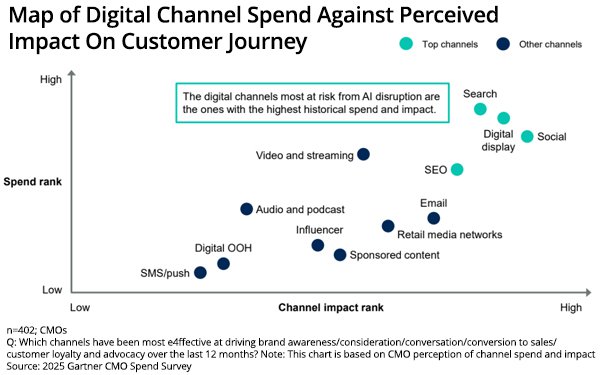
Sixty-five percent of CMOs believe advances in AI will
dramatically change their role within the next two years -- and many will have challenges getting there, a Gartner survey finds.
Artificial intelligence (AI) will automate routine tasks, drive
more personalization and provide deep consumer insights in real time, but many marketing leaders face challenges in implementing processes because they lack skilled talent, teams and processes.
They struggle to move beyond legacy systems and tactical execution to a more strategic, transformation-focused mindset.
Gartner’s survey released this week, conducted
with more than 400 marketers, suggests that 82% of business leaders believe their company’s identity and processes will need to significantly change to keep pace with the impact of AI on
markets.
advertisement
advertisement
Only 5% of marketing leaders who use generative AI as a tool believe significant gains will come from business outcomes.
Changes reside with CMOs -- who will make major
decisions with the company's CTO to either build out their legacy systems, as they did with enterprise mainframe computers, or adapt new technology and start from scratch.
Through these
decisions, a company risks becoming irrelevant or failing if it chooses to "bolt" on AI technology, rather than taking the opportunity to build what comes next for an AI-driven world.
CMOs
must adopt a zero-based approach -- designing for a world where discoverability is mediated by machines rather than people, but trust is still earned through authenticity.
A zero-based
approach is a complete strategy where marketing and advertising expenditures must be justified and approved for each new budget cycle, starting from a "zero base" or clean slate.
Gartner’s study suggests that organizations are not ready for “the promise” AI is intended to provide: automation, hyper-personalization, and a higher percentage of return on
investments. This may be because marketers are not yet seeing the business value they expected.
Most AI initiatives fail because the first step in planning successful agentic strategies is not
AI, according to Gartner -- it is the process, and digital channels like search and social carry a higher risk of failure.
A journey map can help brands meet “functional
demands” required for a future with agentic and generative AI, because today many of those demands are not being met.
Gartner suggests that companies face “a customer engagement
crisis,” where generative AI is disrupting channels, although agentic practices to automate buying online will reshape purchase decisions in ways that reduce human attention and engagement.
Mapping the ways AI fits into the company’s workflows through processes should be the first step. Companies should create maps that identify the best agentic application. and use them, with
alignment between humans and AI on decisions including risks and pain points to improve processes.
Tools and techniques that map implicit workflows will help marketers understand how manual
work across an organization really gets done before moving to agentic workflows.